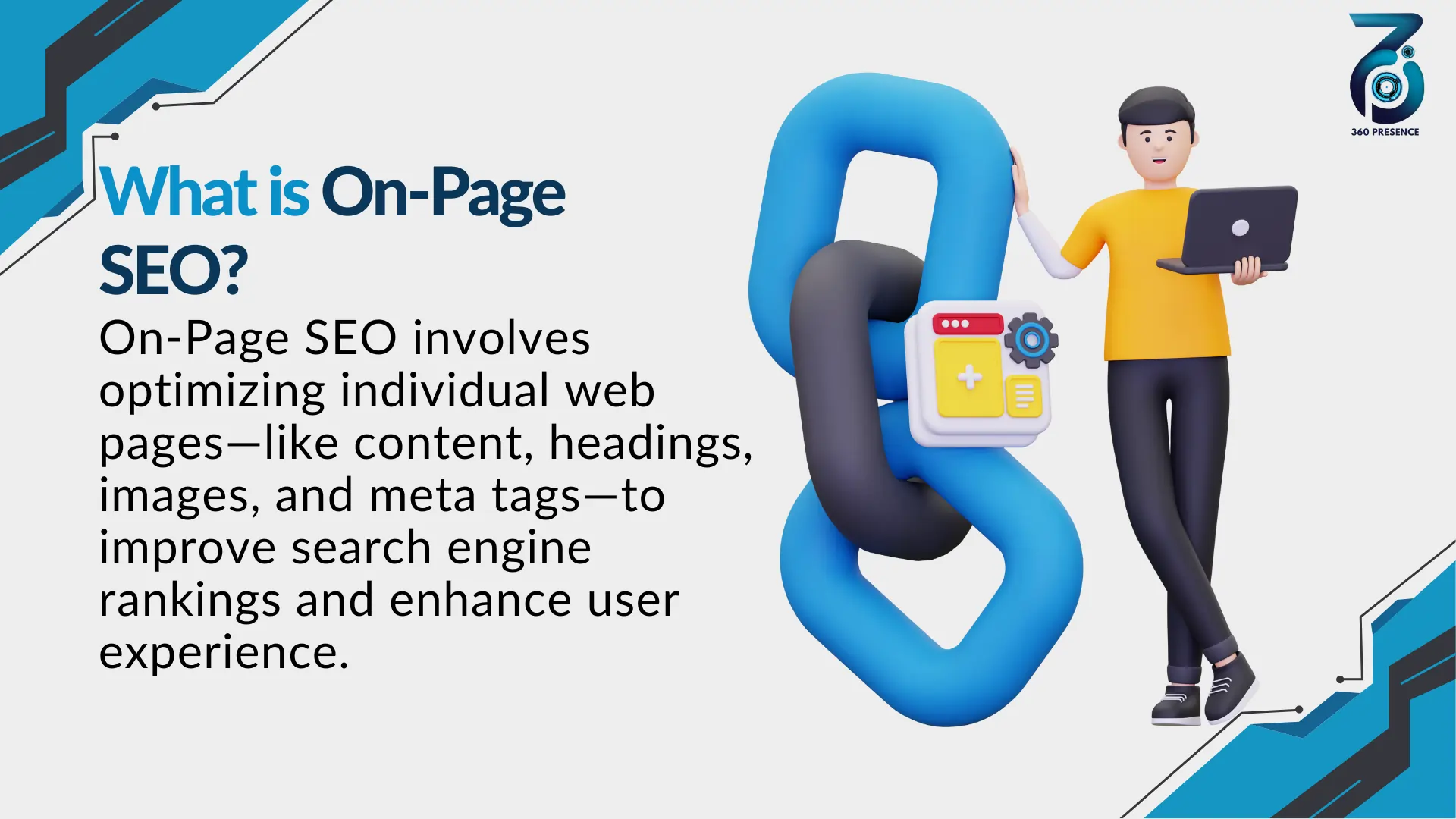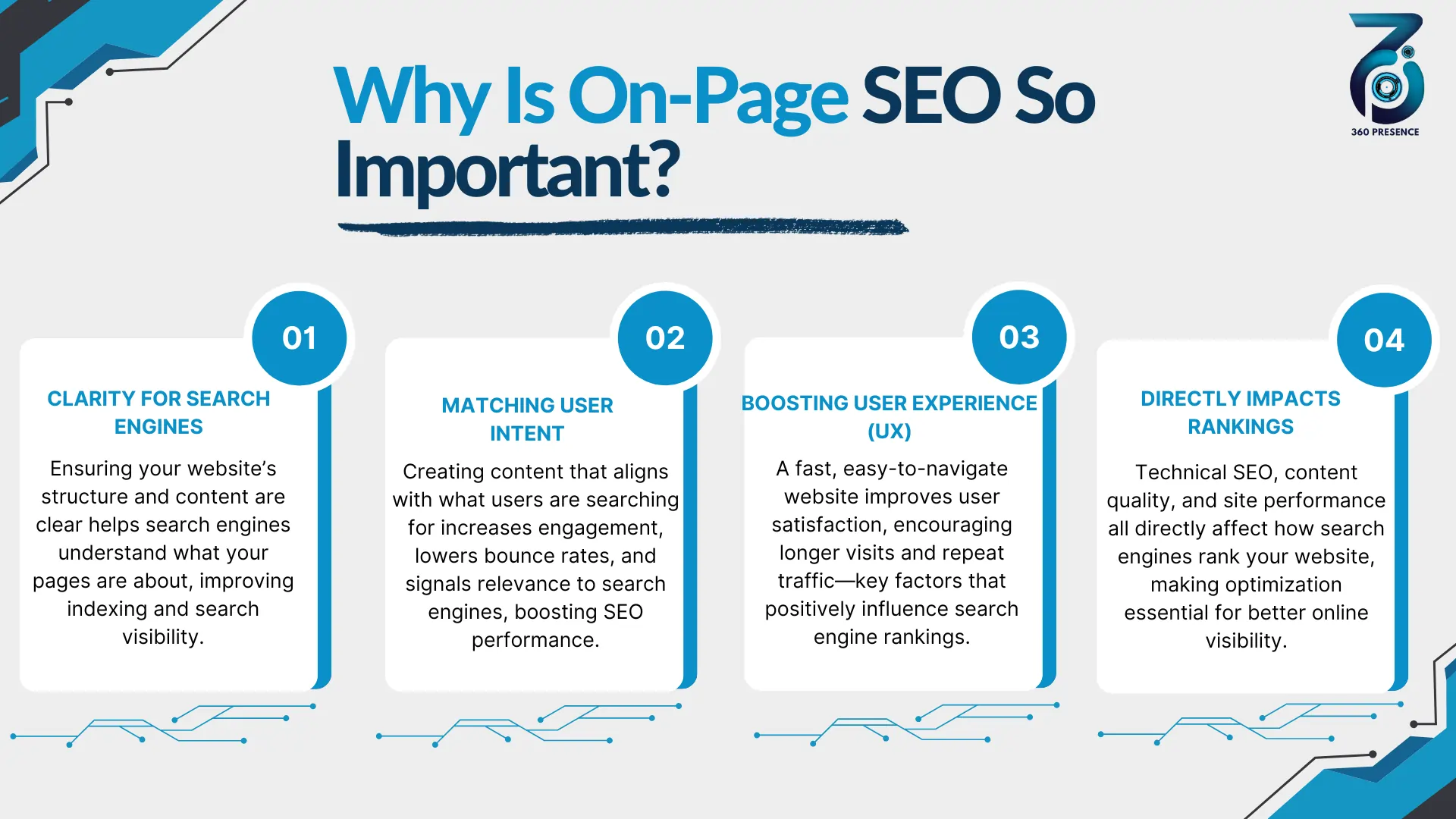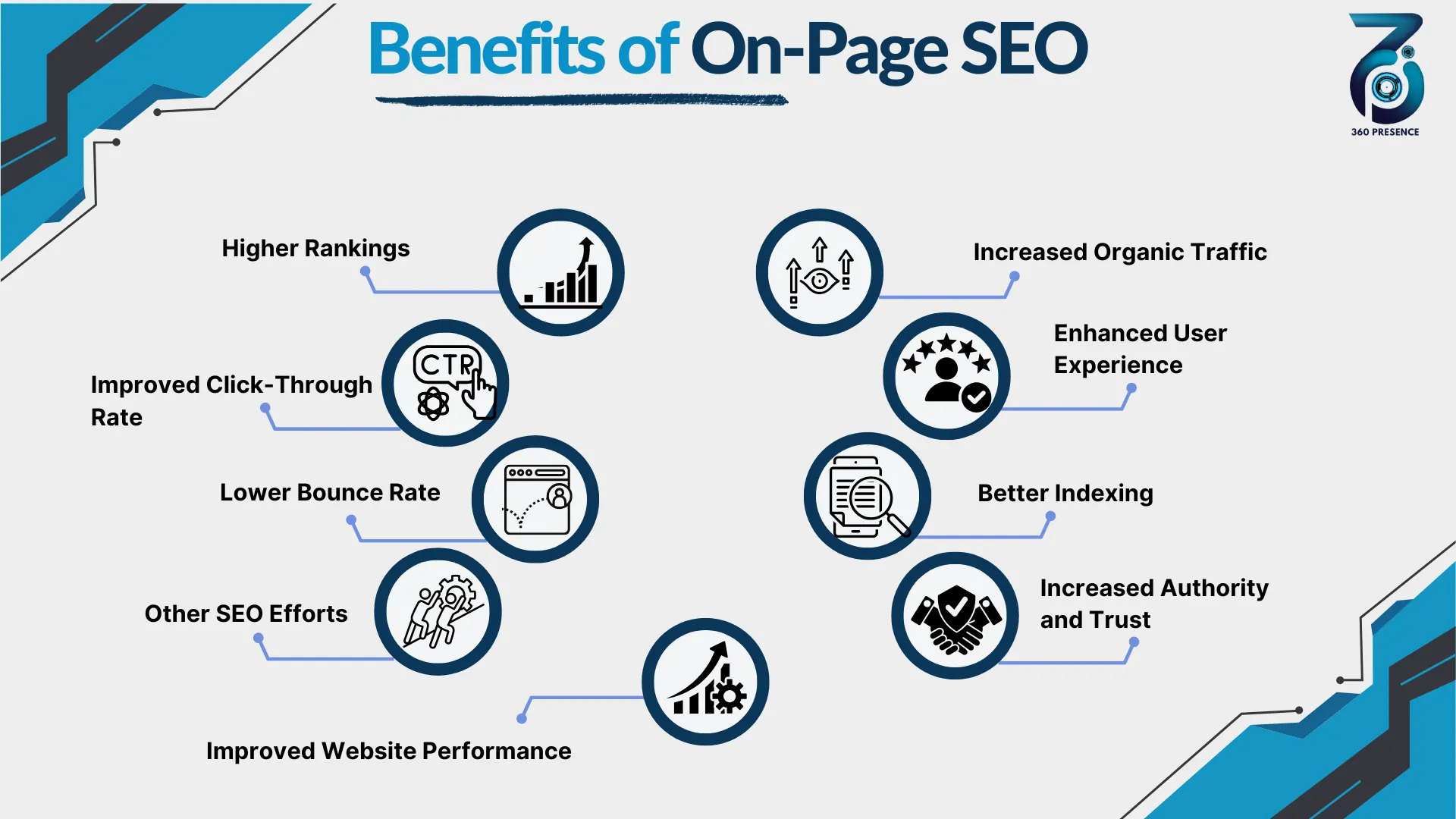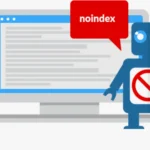What is On-Page SEO?

What is On-Page SEO?
On-Page SEO refers to all the optimization strategies you implement directly on your website’s pages. This includes everything you see and interact with on a webpage, as well as elements in the code that tell search engines more about your content.
The main goal? To help search engines understand the topic and relevance of your page, and to provide a fantastic experience for users who land on it.
While technical Search Engine Optimisation deals with the site’s infrastructure and off-page Search Engine Optimization focuses on external signals like backlinks, On-Page SEO is where your content gets to be the star and where you have the most direct control over optimization.
Importance of On-Page SEO
You might have amazing content, but if search engines can’t figure out what it’s about or if users can’t easily read and engage with it, it won’t rank well. On-Page SEO fixes that.
Here’s why giving your on-page elements some love is critical:
Clarity for Search Engines: Your on-page elements (like your title, headings, and content) are the primary way you signal to Google what your page is about and which keywords it’s relevant for.
Matching User Intent: Effective On-Page SEO helps ensure that your page directly answers the questions or meets the needs of someone using a specific search query. This alignment with user intent is paramount for ranking.
Boosting User Experience (UX): On-page factors like readability, site speed (though also technical!), and mobile-friendliness directly impact how users interact with your page. Good UX leads to lower bounce rates and higher engagement, signals that Google loves.
Directly Impacts Rankings: When Google understands your content’s relevance and sees users engaging positively, it’s a strong signal that your page is a good result for specific searches, leading to higher SERP rankings.
You’re in Control! Unlike building backlinks (which depends on other people), you have full control over your on-page elements. You can implement changes directly and see their potential impact relatively quickly.
Think of On-Page SEO as your opportunity to make a fantastic first impression and communicate the value your page offers to both algorithms and humans.
You May Also Like to Read: Ultimate Guide to SEO Search Engine Optimization: Boost Your Rankings Today!

Benefits of On-Page SEO
Investing time and effort in On-Page SEO isn’t just about ticking boxes for search engines; it’s about building a stronger, more visible, and more user-friendly website that ultimately contributes to your online success. Here are the key benefits you can expect:
Higher Rankings in Search Results: This is often the most sought-after benefit. By optimizing your on-page elements – your title tags, meta descriptions, headings, content, and more – you make it easier for search engines like Google to understand what your page is about and how relevant it is to specific search queries.
When search engines recognize this relevance, they are more likely to rank your page higher in the Search Engine Results Pages (SERPs). Appearing higher in search results dramatically increases your visibility to potential visitors.
Increased Organic Traffic: A direct consequence of higher rankings is a significant increase in organic traffic to your website. When your pages appear at the top of the SERPs, more people will see your links and click through to your site.
This traffic is highly valuable because it comes from users who are actively searching for information, products, or services related to your content, making them more likely to be interested in what you offer.
Improved Click-Through Rate (CTR): Your title tag and meta description are your first impression in the search results. By crafting compelling and informative title tags and meta descriptions that accurately reflect your page’s content and include relevant keywords, you entice users to click on your link over others.
A higher CTR not only brings more visitors to your site but can also signal to search engines that your listing is more relevant and appealing, potentially further boosting your rankings.
Enhanced User Experience (UX): Many On-Page SEO best practices are also fundamental to creating a positive user experience. Well-structured content with clear headings, readable fonts, appropriately sized images, and a mobile-friendly design makes it easy and enjoyable for visitors to consume your content.
A good user experience keeps visitors on your site longer, reduces bounce rates, and encourages them to explore other pages, all of which are positive signals to search engines.
Lower Bounce Rate: The bounce rate is the percentage of visitors who leave your website after viewing only one page. When your on-page elements are optimized, your content is relevant to the user’s search query, and the page is easy to navigate and read, visitors are more likely to stay on your site and explore further.
A lower bounce rate indicates to search engines that your page is providing valuable content and a good user experience.
Better Indexing and Understanding by Search Engines: On-Page SEO helps search engine crawlers efficiently understand and index your content. By using relevant keywords in key areas, providing clear heading structures, and optimizing your images with alt text, you give search engines the necessary clues to accurately categorise your page and understand its context.
This ensures that your page is considered for the most relevant search queries.
Foundation for Other SEO Efforts: On-Page SEO is the bedrock of a successful overall SEO strategy. Without a solid on-page foundation, your off-page efforts, such as link building, may not be as effective. Optimizing your pages makes them more worthy of ranking and more likely to attract natural backlinks from other reputable websites.
Increased Authority and Trust: When your website consistently ranks well for relevant keywords and provides a positive user experience, it builds authority and trust with both users and search engines. Users are more likely to trust a website that appears prominently in search results and offers a seamless browsing experience.
This increased trust can lead to higher engagement, more conversions, and a stronger brand reputation.
Improved Website Performance: Many On-Page SEO techniques, such as image optimization and improving page speed, directly contribute to the overall performance of your website.
A faster, more efficient website not only pleases users but is also favoured by search engines, especially in a mobile-first world.

Conclusion
On-Page SEO is your opportunity to directly influence how search engines perceive your content and how users experience it. By focusing on creating high-quality, relevant content and optimizing your title tags, meta descriptions, header tags, images (alt text), and internal structure, you send clear signals to Google about what your page is about. Paying attention to user intent, readability, and overall presentation ensures that once users arrive from the SERPs, they find exactly what they’re looking for in an easy-to-digest format.
Mastering On-Page SEO is a fundamental step in any successful Search Engine Optimization strategy. It’s within your control, and by consistently optimizing these elements, you significantly improve your chances of ranking higher, attracting more organic traffic, and providing real value to your audience.
Partner with Nauman Oman
Recent Posts
Working Together Ideas come to life
No matter how big your company is, as you expand and reach new highs you’ll want an agency to have your back. One with a process
360presence@gmail.com

© 2023 360PRESENCE All rights Reserved
















